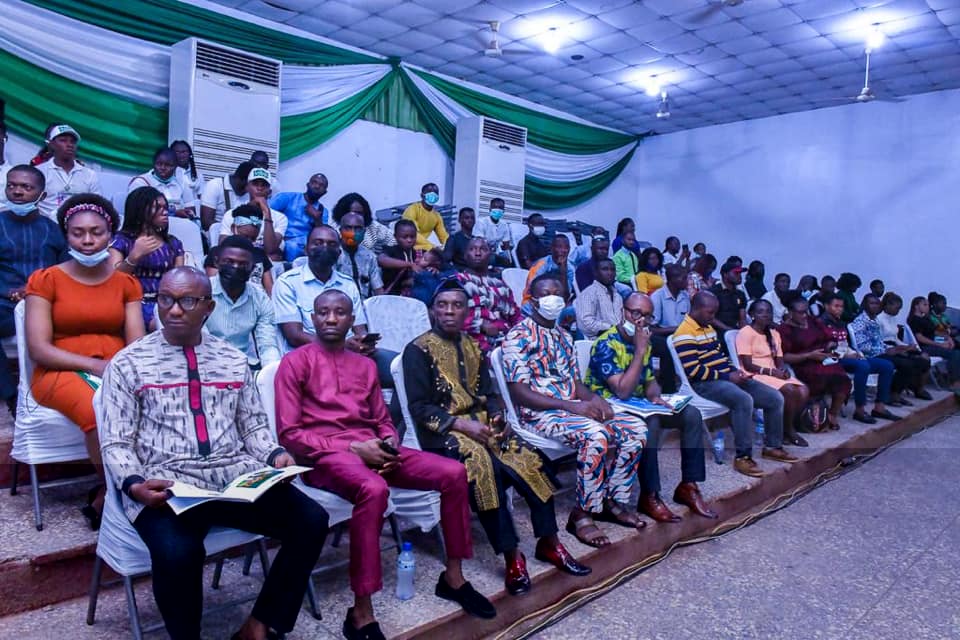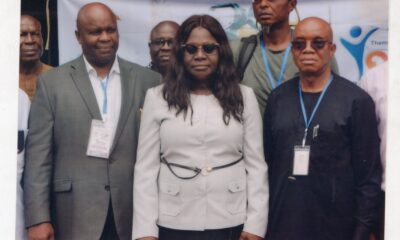Editorial
Learning From PH Stampede

Evidence that Nigerians are yet to imbibe the critical culture of crowd management as an essential part of everyday living emerged at a recent stampede at the Port Harcourt Polo Club where 31 people reportedly died with several others sustaining life-threatening injuries. This was an unfortunate incident that could have been prevented if the organisers had been well grounded in crowd control skills and cared about safety measures.
The event occurred at a church charity exhibition on Saturday, May 28, 2022. The programme, organised by the Kings Assembly Pentecostal Church, involved many people who were seeking assistance and so attended the annual “Shop for Free” charity programme coordinated by the church. Such events are common in Nigeria, Africa’s largest economy, where more than 80 million people live in abject poverty, according to government statistics.
The charity activity was to commence at 9 a. m., but dozens of people arrived as early as 3 a.m. to secure their places in queues. Somehow they broke open the locked and secured gates, resulting in the painful incident. Videos from the scene displayed the clothes, shoes and other paraphernalia meant for the beneficiaries, including the lifeless bodies of some victims.
The 31 persons may have died due to stampede but the real cause of the deaths is hunger and poverty in the land, nothing more, nothing else. It is only hunger that can push people to deprive themselves of their precious sleep and go out to queue up for food at 3 a.m., a clear six hours before the event was billed to start.
The government owes the citizens a duty to provide jobs for the youths and pull them out of the poverty bracket. It is also the responsibility of the Nigerian government to check the rising inflation, which is the reason the masses can no longer afford to buy basic food items and have to resort to free food to feed their families.
This episode is highly regrettable. Nevertheless, the question is, how was the church unable to anticipate the number of people that would show up at the venue? We are asking because offering indigent Nigerians free items like foodstuffs indicated that there was going to be a very large crowd turnout, especially with the horrifying figures of high unemployment and hunger in the country.
While we appreciate churches and other voluntary organisations that strive to fill in the gap that exists in the living conditions of the poor in the society, we make bold to insist that such organisations should entrench safety considerations into whatever they do. Organisers of such tremendous events should plan well and possibly involve the police to avert similar calamitous deaths and injuries.
Despite past occurrences that claimed lives, the trend has persisted, either during sporting events, religious gatherings or political rallies. People are often encouraged to leave the comfort of their homes for an event potentially capable of attracting gigantic crowds without adequate consideration for their safety. Worse still, after tragedy must have struck, everybody goes home to await a future re-enactment of the calamity; essentially, no lesson is learned.
At a campaign rally of President Muhammadu Buhari in Port Harcourt towards the 2019 general elections, 14 people reportedly died. Also in 2019, a rally at the Jolly Nyame Stadium in Jalingo, Taraba State, was recounted to have left five people dead, following a stampede. In Kano, when the presidential candidate of the Peoples Democratic Party (PDP), Atiku Abubakar, visited, it was by sheer providence that death was averted after nine people slumped, following another uncontrollable crowd turnout.
As can be seen, many religious groups have not fared better, as a few incidents would confirm. In November 2013, no fewer than 28 people were recorded dead after crowd trouble that occurred at a crusade ground of the Holy Ghost Adoration Ministry, Uke, in Idemili Local Government Area of Anambra State. The event, attended by the then governor, Peter Obi, allegedly attracted a larger crowd than usual, leaving organisers at their wits’ end.
A similar situation happened in Benin City, back in 1999, when renowned evangelist, late Reinhard Bonnke, came calling. No fewer than 14 persons were feared dead as people came to listen to the fiery German preacher speak at a crusade held at a sports facility in the Edo State capital. Despite the number of casualties, more people were said to have turned up again the next day, even when the preacher decided not to attend.
Perhaps, the most contemptible of all was the Immigration interview organised by the then Internal Affairs Minister, Abba Moro, in which about 19 Nigerian job seekers lost their lives. In one of the most audacious and exploitative ventures, no fewer than 520,000 applicants from all over the country were corralled into stadia nationwide for a job interview for only 4,556 slots, after each of them was charged N1,000. The deaths occurred following stampedes.
While the tragedies mount, and valuable lives are lost, nobody seems to mind about asking individuals to defend their roles in what, in other climes, amount to national calamities. No one is punished. This is where the situation in Nigeria differs from what obtains in other locales. In the United Kingdom, for instance, which also used to have a lot of crowd trouble, especially during football matches, measures were introduced that reduced it drastically.
Though the Kings Assembly had good and noble intentions, and it is strongly recommended that such a gesture should continue regardless of the incident; however, the truth is people died, precious lives were lost all due to some fatal errors emanating from improper planning. Hence, the fundamental question to ask is, as fantastic and kind as the programme might be, does it absolve the church from liability? Certainly not.
Therefore, Governor Nyesom Wike should inaugurate a probe panel forthwith as he rightly indicated in his response to the disaster. Such inquiry should specify the direct causes of the rush and whether there was criminal negligence. Police Commissioner, Eboka Friday, should act likewise by compelling his men to conduct a thorough investigation into the matter. Those found to be culpable must be prosecuted.
The way out is to ensure that people are not admitted beyond the capacity of an event arena. Once the venue of an occasion is full, entry should be disallowed. Again, there should be crucial measures to guarantee that entrances and exits are flung open before and after an event, so that a stadium, no matter how crowded, could be emptied of its occupants within a few minutes of a critical event. Since political rallies and church programmes are now held in stadiums, these crowd control measures should apply.
Our heartfelt condolences to the families of the victims. And may God grant the souls of the departed eternal rest!
Editorial
Responding To Herders’ Threat In Rivers

Editorial
Democracy Day: So Far…

Nigeria’s return to democratic rule in 1999 marked a watershed moment in the nation’s political history. After enduring nearly 16 years of successive military dictatorships, Nigerians embraced a new era of civil governance with the inauguration of President Olusegun Obasanjo on May 29, 1999. Since then, the country has sustained a democratic system for 26 years. But, this democratic journey has been a complex mix of progress and persistent challenges.
The formal recognition of June 12 as Democracy Day in 2018 by former President Muhammadu Buhari acknowledged a long-standing injustice. The annulment of the 1993 presidential election, Nigeria’s freest, betrayed the democratic aspirations of millions. That it took decades to honour this date reflects the nation’s complex relationship with its democratic memory.
One of the most momentous successes of Nigeria’s democracy has been the uninterrupted civilian rule over the last two and a half decades. The country has witnessed seven general elections, with power transferring peacefully among different political parties. This is particularly notable considering that prior to 1999, no civilian government had completed a full term without military intervention. The peaceful transitions in 2007, 2015, and 2023 are testaments to Nigeria’s evolving democratic maturity.
Electoral participation, while uneven, has also reflected a level of democratic engagement. In 2003, voter turnout stood at about 69 per cent, but this figure dropped to approximately 34.75 per cent in 2023, according to the Independent National Electoral Commission (INEC). Although the declining turnout raises concerns, it also highlights the increasing expectations of the electorate, who demand credible and transparent elections.
Another area of progress is the growth of a vibrant and free press. Nigerian media has played a crucial role in holding governments accountable and fostering public discourse. Investigative journalism and civil society activism have exposed corruption and human rights abuses. The rise of social media has further expanded the democratic space, enabling young Nigerians to mobilise and advocate for change, as evidenced by the 2020 #EndSARS protests.
Judicial independence has seen mixed results. On one hand, the judiciary has occasionally demonstrated resilience, such as in landmark rulings that overturned fraudulent elections or curtailed executive excesses. On the other hand, allegations of political interference and corruption within the judiciary persist, undermining public confidence in the legal system’s impartiality.
Nigeria’s democracy has also facilitated the decentralisation of power through the federal system. State governments now wield some autonomy, allowing for experimentation in governance and service delivery. While this has led to innovative policies in some states, it has also entrenched patronage networks and uneven development across the federation.
Despite these successes, Nigeria’s democratic journey faces formidable problems. Electoral integrity remains a critical concern. Reports from election observers, including those from the European Union and ECOWAS, frequently highlight issues such as vote-buying, ballot box snatching, and violence. The introduction of the Bimodal Voter Accreditation System (BVAS) and electronic transmission of results in 2023 elections showed promise, but technical glitches and alleged manipulations dampened public trust.
Corruption continues to be a pervasive issue. Nigeria ranks 145th out of 180 countries on Transparency International’s 2023 Corruption Perceptions Index, with a score of 25/100. Democratic institutions meant to check graft—such as anti-corruption agencies and the legislature—often struggle due to political interference and weak enforcement mechanisms.
Security challenges have also strained Nigeria’s democracy. Insurgency in the North East, banditry in the North West, separatist agitations in the South East, and herder-farmer conflicts across the Middle Belt have collectively resulted in thousands of deaths and displacements. According to the Global Terrorism Index 2024, Nigeria ranks as the eighth most impacted country by terrorism. The government’s difficulty in ensuring safety erodes public confidence in the state’s capacity and legitimacy.
The economy poses another critical remonstrance. Nigeria’s Gross Domestic Product (GDP) per capita stands at approximately $2,400 as of 2024, with over 40 per cent of the population living below the national poverty line. High unemployment and inflation have fueled discontent and disillusionment with democratic governance, especially among youth. Without addressing economic grievances, the democratic dividend will remain elusive for many Nigerians.
Ethnic and religious divisions further complicate Nigeria’s democratic consolidation. Politicians often exploit identity politics for electoral gains, exacerbating social tensions. Although federal character principles aim to promote inclusiveness, they have also sometimes fostered a quota mentality rather than merit-based appointments.
Gender representation remains inadequate in Nigeria’s democratic institutions. Women occupy less than 10 per cent of seats in the National Assembly, one of the lowest rates globally. Efforts to pass gender parity bills have faced stiff resistance, highlighting deep-seated cultural and institutional barriers to female political participation.
Civil liberties, while constitutionally guaranteed, are under threat. Crackdowns on protesters, restrictions on press freedom, and surveillance of activists reveal an authoritarian streak within the democratic framework. The controversial Twitter ban in 2021 exemplified the country’s willingness to curb digital freedoms, prompting domestic and international criticism.
The political crisis in Rivers State embodies broader democratic struggles. Attempts to control the state through undemocratic means expose weaknesses in federal institutions and the rule of law. Immediate restoration of democratic governance in Rivers State is vital to preserving Nigeria’s democratic integrity and institutional credibility.
Local governments remain under the control of state governors, depriving citizens of grassroots democracy. Last year’s Supreme Court judgment on local government autonomy is promising, but state-level resistance threatens its implementation. Genuine autonomy would bring governance closer to the people and foster democratic innovation.
As we mark Democracy Day, we must honour the sacrifices of Chief M.K.O. Abiola, Kudirat Abiola, Femi Falana, Chief Gani Fawehinmi, Pa Alfred Rewane, President Bola Tinubu, and countless others, who fought for Nigeria’s freedom. As democracy in Nigeria continues to evolve after 26 years, this day should inspire action toward its renewal. With despotism and state failure as real threats, both citizens and leaders must take responsibility—citizens by demanding more, and leaders by delivering. Excuses are no longer acceptable.
Editorial
Nigeria’s Plastic Pollution Emergency

Yesterday, Nigeria joined the rest of the world to mark 2025 World Environment Day. The occasion serves as a stark reminder that our battle against plastic pollution requires more than symbolic gestures—it demands sustained, coordinated action from all levels of government. As communities worldwide grapple with mounting environmental challenges, Nigeria’s approach to plastic waste management stands at a critical juncture.
Dr. Ibinabo Ogolo, a Research Fellow at the Institute of Geosciences and Environmental Management at Rivers State University, has issued a timely call for comprehensive enlightenment campaigns targeting indiscriminate plastic waste disposal. Her message resonates with the urgency that characterises this year’s global theme: “Beat Plastic Pollution.”
The core challenge lies not in policy formulation but in implementation. Years of environmental initiatives have fallen short primarily due to inadequate public education and awareness campaigns. Citizens cannot be expected to adopt responsible waste disposal practices without understanding the gravity of their actions or knowing the proper alternatives.
Government platforms at federal, state, and local levels possess the infrastructure necessary to reach every corner of our society. Television, radio, social media, community meetings, and educational institutions provide ready channels for sustained messaging. The tools exist; what remains is the political will to deploy them effectively and consistently.
This year’s World Environment Day theme underscores the global recognition of plastic pollution’s devastating impact on ecosystems, wildlife, and human health. The message is clear: plastic waste represents one of the most pressing environmental challenges of our time, requiring immediate and sustained attention from policymakers and citizens alike.
The health implications of plastic pollution extend far beyond environmental aesthetics. Industrial and medical plastic wastes often contain toxic chemicals with carcinogenic properties, posing direct threats to human health. These materials don’t simply disappear when improperly disposed of-they infiltrate our environment, contaminating soil, water sources, and food chains.
Plastic additives released into the environment create a cascade of contamination that affects entire ecosystems. Wildlife suffers through ingestion, entanglement, and habitat destruction, while humans face exposure through contaminated water, food, and air. The interconnected nature of these impacts demands a comprehensive response that addresses both immediate disposal practices and long-term prevention strategies.
The link between plastic pollution and serious health conditions, including breast, ovarian, liver, and lung cancers, as well as various hormonal disorders, underscores the urgency of public education campaigns. Citizens have the right to understand how their daily choices affect not only environmental health but their own well-being and that of their families.
Despite scientific awareness of ocean plastic pollution dating back approximately 50 years, Nigeria’s rivers, creeks, and waterways continue to suffer from plastic waste invasion. This represents a failure of sustained commitment rather than a lack of knowledge about the problem’s existence and solutions.
The ritualistic approach to World Environment Day celebrations must end. Annual speeches and symbolic cleanups, while valuable, cannot substitute for year-round, systematic efforts to change behaviour and protect our environment. Governments must develop comprehensive frameworks that extend beyond June 5th commemorations.
Sustained enlightenment campaigns require dedicated funding, clear messaging, measurable objectives, and regular evaluation. Success depends on consistency, creativity, and community engagement that transforms environmental protection from a government mandate into a shared cultural value.
The path forward demands that all stakeholders-government officials, community leaders, educators, and citizens-recognize their roles in combating plastic pollution. Only through sustained, coordinated efforts can we hope to achieve the behavioural changes necessary to protect our environment and secure a healthier future for generations to come.
-
Business2 days ago
Create Diving Schools, Expert Urges FG
-

 News2 days ago
News2 days agoFoundation Tasks Parents, Families On Moral Rectitude
-
News2 days ago
COAS Hails 542 New Military Retirees Over Selfless Service
-

 Politics2 days ago
Politics2 days agoYou Weren’t Elected To Bury People, Tinubu Tells Alia
-
Sports2 days ago
NAFA President meets NSC Over tournaments in Egypt
-
Business2 days ago
Okpebholo Charges Committee To End Herders, Farmers Clash In Edo … Inaugurates Boundary Committee
-
Niger Delta2 days ago
Rep Member Attracts N1.7bn Projects To Ibiono Ibom/Itu Constituency
-

 News2 days ago
News2 days agoDeputy Leader, 32 Other Iceland Members Denounce Cultism In Khana

